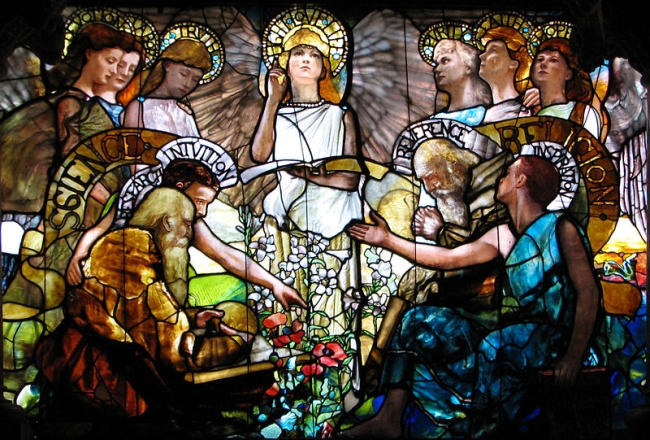You have /5 articles left.
Sign up for a free account or log in.

Tiffany window at Yale University, showing science and religion
Wikimedia Commons
Headlines regularly illustrate divides between science and religion over issues such as evolution, which many evangelicals reject.
But poll results presented Sunday at the annual meeting of the American Association for the Advancement of Science suggest that the divide may be less absolute than many imagine (at least if you go beyond issues such as evolution).
A researcher at Rice University conducted a poll of 10,000 people -- grouped as the American general public, scientists and evangelical Protestants. While some people imagine scientists to be godless, the poll found that scientists are only slightly less religious than the American public, which itself isn't terribly observant by many measures. And many scientists do have faith of various types.
Scientists vs. General Public on Religious Observance
| Scientists | General Public | |
| Attend weekly religious services | 18% | 20% |
| Consider themselves religious | 15% | 19% |
| Read religious texts weekly | 13.5% | 17% |
| Pray several times a day | 19% | 26% |
The study also found that evangelical Protestants are more likely than the general public (50 percent vs. 38 percent) to believe that science and religion can work together.
At the same time, other parts of the paper pointed to differences between evangelical Protestants, the general public and scientists. While 36 percent of scientists say that they have "no doubts" about the existence of God, the figure is 56 percent for the public and 87 percent for evangelical Christians.
Just as the above data show that plenty of scientists are religious, it's also the case that significant numbers of scientists are evangelical Christians. But while the shares of various Christian groups in the scientist population lagged the general public survey, non-Christians (including atheists) were overrepresented in the scientist pool.
Scientists and the Public by Religious Belief
| Public | Scientists | |
| Evangelical Protestant | 22.9% | 17.1% |
| Mainline Protestant | 26.9% | 24.9% |
| Roman Catholics | 23.8% | 19.1% |
| Jews | 1.9% | 3.9% |
| Mormons | 1.8% | 1.7% |
| Muslims, Hindus, Buddhists, Sikhs, Jains | 2.6% | 7.2% |
| Atheists/Agnostics/No Religion | 15.5% | 24.4% |
| Other | 4.7% | 1.7% |
Other findings in the survey point to significant differences between scientists and evangelical Protestants, nearly 60 percent of whom said that scientists "should be open to considering miracles in their theories or explanations.”
And evolution remains a point on which scientists and evangelical Protestants are far apart. While 42 percent of evangelical Protestants favor teaching creationism instead of evolution in the public schools, only 10 percent of scientists do so. And another 25 percent of evangelical Protestants favor teaching creationism along with evolution in the public schools; only 14 percent of scientists do so.
Sunday's paper was done by Elaine Howard Ecklund, the Autrey Professor of Sociology and director of the Religion and Public Life Program at Rice, and Christopher Scheitle, assistant professor of sociology at Saint John's University in Minnesota.
More Respect for Scientists Than Knowledge of Science
Another poll presented at the AAAS meeting suggests that scientists have broad respect from the public, but that this respect doesn't necessarily translate into a grasp of basic scientific facts. John Besley, associate professor of advertising and public relations at Michigan State University, presented results from a National Science Foundation-sponsored poll of the public that found that more than 90 percent of Americans think scientists are "helping to solve challenging problems" and are "dedicated people who work for the good of humanity."
However, only 74 percent knew that the Earth revolved around the sun, and fewer than half (48 percent) knew that human beings evolved from earlier species of animals.








